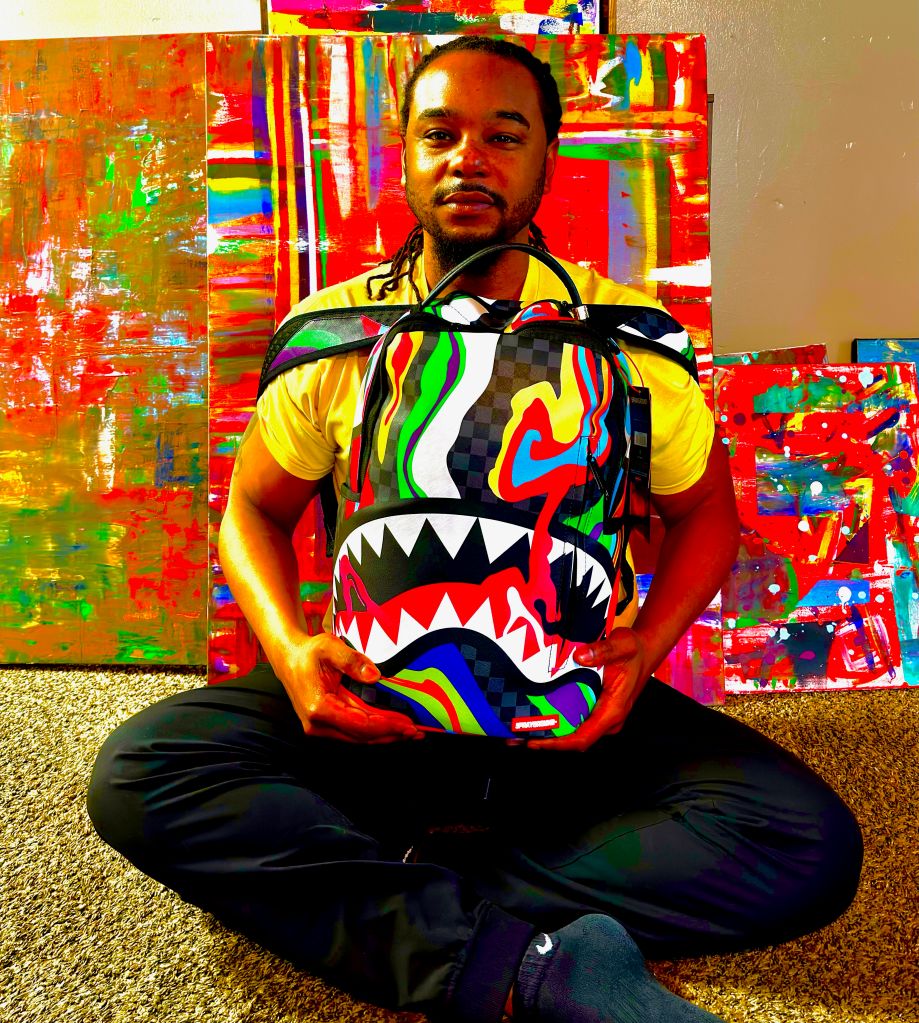Sprayground At 15: Redemption, Access & The Culture We Carry
Sprayground At 15: Redemption, Access & The Culture We Carry [Op-Ed]

Bags are ancient. Style is sacred. If clothes were the first thing Eve designed post-apple bite, then the bag that carried her and Adam’s stuff after their eviction from Eden was surely the first intentional accessory. That bag must have carried the weight of the world. Or maybe it carried the tools that would lead to redemption. Perhaps all our bags are carrying so much weight. Our bags are reminders of the universal truth that we are all carrying something with us. That life requires us to carry things is also an opportunity for expression. It is in this route of ancient and sacred, style and truth, humanity and expression, that the ingenious Sprayground has flourished, converting me into a member of its global consumer base.
Fifteen years ago, Sprayground exploded onto the scene with a single idea: backpacks could be more than just utility — they could be bold, rebellious, and speak the language of culture. What started as a rogue design on a shark-mouthed bag has evolved into a global streetwear phenomenon. At the heart of that evolution is a story not just about fashion, but about redemption, access, and the art of building new worlds — one bag at a time.
Sprayground’s success isn’t just stitched in fabric and flair. It’s built on risk, second chances, and the radical act of giving voice to those who rarely get the mic in fashion. Few embody that spirit more than James Ferrell — a driving force behind the brand and a living testament to its ethos.
James’ story isn’t one of overnight success or traditional pedigree. It’s one of navigating adversity, stepping into rooms not built for you, and turning lived experience into cultural capital. Ferrell’s path is deeply intertwined with Sprayground’s rise. He brought vision and lived resonance — understanding the power of streetwear as a form of coded language, self-reclamation, and resistance. “When you’re wearing Sprayground,” he’s said, “you’re not just wearing a backpack — you’re wearing a message.” That message? That style is access. That redemption isn’t abstract. That culture isn’t to be borrowed — it’s to be honored.
I met James in the aftermath of Breonna Taylor and George Floyd’s preventable deaths. We were both at an event hosted by the Black Music Action Coalition and #breathewithme—industry-leading non-profits fighting to ensure equity and access across the entertainment sector. The event focused on bringing together a diverse range of advocates, leaders, and innovators to amplify truth and repair efforts led by former Congresswoman Barbara Lee and the late Sheila Jackson Lee. As is common in these environments, James and I got to talking a little off-topic.
I was taken by a Limited Edition Sprayground backpack adorned in the names Sandra Bland, George Floyd, Breonna Taylor and so many others, inexplicably killed by police. The names, the cut and style of the bag, the colorway, the price point, and the secret pocket drew me. Together, these elements revealed a deeper insight into the creators and brand that brought it to life. And so I asked James just that, or at least something close to: “So what would you say Sprayground is all about?” And James, without flinching, responded: “It’s about redemption for me.” Taking a short breath, James confessed, “ I’ve not always done the right thing, and bringing attention to the right things through this brand is the least I can do.”
I purchased the bag, taking it on all of my journeys from my classroom to my research sites to Capitol Hill and all the places in between. Time and again, I was often stopped by folks from all walks of life who were moved by the spirit of the message and style emanating from the bag. Others often spoke a name aloud to me with a tone and timbre of compassion, love, and shared grief. The bag carried connection, human resonance.
As Sprayground celebrates its 15th anniversary, it’s more than a brand milestone — it’s a cultural marker. A generation has come of age seeing fashion that doesn’t just follow trends but makes statements. Collaborations with artists, musicians, and movements have turned the company into a canvas for expression — unfiltered and unapologetic. African Intelligence or AI, a personal favorite, is a collaboration with singer-designer Sandflower that fuses elements of sacred geometry, ancient tribal patterns, and veneration of Africa. This creative fusion performs the act of Sankofa—the Akan principle to go back and retrieve knowledge, critical reflection, and love. These limited edition AI bags celebrate African experience and knowledge as a source and origin. Like all of Sprayground’s catalogue, intentional style is used to express, adorn, and celebrate human ingenuity, industriousness, experience, and creativity. From classrooms to corner stores to concert stages, Sprayground bags are worn by people whose style reflects their story.
Redemption. Access. Culture. For Sprayground, these aren’t buzzwords — they’re the fabric of the brand. And for James Ferrell, they’re personal. His journey mirrors that of many who found themselves on the margins only to realize the edges are where the lines of true opportunity are.
In an era where authenticity is often a tagline, Sprayground continues to show us the redemptive power of culture to carry us toward our shared purpose. When people like Ferrell step forward, not just to be seen, but to reshape the narrative entirely, the powerful convergence of ancient and sacred activates the grid of human experience.
Happy 15th, Sprayground. The ancestors are pleased — and still walking with you.
Dr. Marcus Anthony Hunter is the Scott Waugh Endowed Chair in the Division of the Social Sciences at UCLA. He is a professor in the Departments of Sociology & African American Studies, and author of the book, “Radical Reparations: Healing the Soul of a Nation.”
SEE ALSO:
Black August Lesson: ‘Denim Is Interwoven With Stories Of Struggle And Resistance’
Op-Ed: Black August Is More Than History—It’s A Mandate For Action








